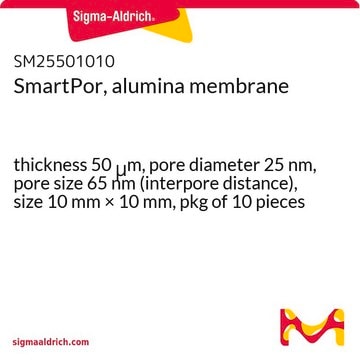WHA68095522
Whatman® alumina Anodisc filter discs 0.2 μm pore size
transparent, hydrophilic, PP support ring, 50 ea, 47 mm diam
Synonym(s):
Z745073
About This Item
Recommended Products
product name
Whatman® Anodisc inorganic filter membrane, unsupported, diam. 47 mm, pore size 0.2 μm, autoclavable: no
material
alumina based membrane cap
sterility
non-sterile
feature
autoclavable: no
packaging
pkg of 50 ea
manufacturer/tradename
Whatman 6809-5522
Whatman Article No. 28420415 (US reference)
diam.
47 mm
pore size
0.2 μm
Looking for similar products? Visit Product Comparison Guide
Related Categories
General description
The Anopore inorganic membrane (Anodisc) is well suited for a wide range of laboratory filtration applications. This novel material has a precise, nondeformable honeycomb pore structure with no lateral crossovers between individual pores, that filters at precisely the stated cut-off, allowing no larger sized particles to pass through the membrane. The Anopore inorganic membrane is composed of a high purity alumina matrix that is manufactured electrochemically. The membrane also exhibits low protein binding, has minimal autofluorescence, is nontoxic, and supports cellular growth.
The precise pore structure and narrow pore size distribution of the Anopore membrane ensure a high level of particle removal efficiency. Microorganisms and particulate material are captured on the surface of the membrane for subsequent analysis by light or electron microscopy. When wet, the membrane is virtually transparent, which means that retained particles do not need to be transferred to another surface before microscopic examination.
The membrane is hydrophilic and is compatible with most solvents and aqueous material. No monomers, plasticizers, adhesives, surfactants or wetting agents are used in the manufacturing process, which eliminates sample contamination and ensures low protein binding and minimal loss of sample.
Application
- HPLC mobile phase filtration and degassing
- Ultra cleaning of solvents
- Gravimetric analysis
- Liposome extrusion
- Scanning electron microscopy studies
- Bacterial analysis by epifluorescence light microscopy
- Micrometer and nanometer filtration
- Metal nanorods formation
Features and Benefits
- Virtually transparent when wet
- Minimal autofluorescence
- Hydrophilic with wide solvent compatibility
- Non-toxic for cellular growth
Other Notes
Legal Information
Choose from one of the most recent versions:
Certificates of Analysis (COA)
Sorry, we don't have COAs for this product available online at this time.
If you need assistance, please contact Customer Support.
Already Own This Product?
Find documentation for the products that you have recently purchased in the Document Library.
Customers Also Viewed
Our team of scientists has experience in all areas of research including Life Science, Material Science, Chemical Synthesis, Chromatography, Analytical and many others.
Contact Technical Service






